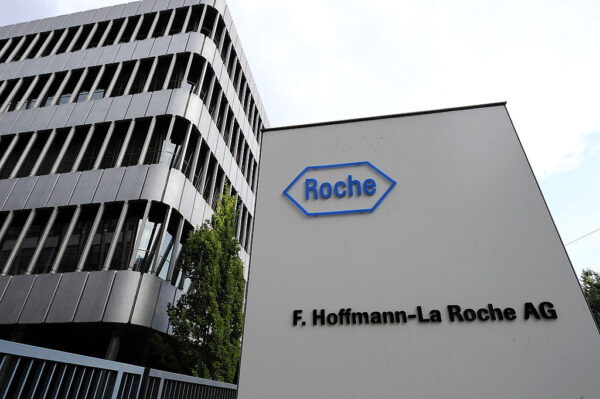
A new Roche drug for blood cancer has won FDA approval, bringing patients another therapeutic option and one that will compete against a recently approved AbbVie drug that goes after the same targets.
The FDA approved Roche’s glofitamab as a treatment for diffuse large B-cell lymphoma (DLBCL) as well as large B-cell lymphoma (LBCL) arising from follicular lymphoma. Roche said this new drug will become available in coming weeks, marketed under the brand name Columvi.

With the Rise of AI, What IP Disputes in Healthcare Are Likely to Emerge?
Munck Wilson Mandala Partner Greg Howison shared his perspective on some of the legal ramifications around AI, IP, connected devices and the data they generate, in response to emailed questions.
DLBCL is a form of non-Hodgkin’s lymphoma, a cancer of white blood cells called lymphocytes. This cancer is the most common form of non-Hodgkin’s lymphoma in the U.S. Drug combinations that incorporate chemotherapies are standard treatment, but new drugs are needed for those whose cancer relapses or does not respond to initial lines of therapy. Approval of Columvi covers the treatment of adults whose DLBCL has not responded to two or more lines of systemic therapy.
Columvi is part of a class of drugs called bispecific antibodies. The Roche therapy is engineered with one arm that binds to a protein on cancerous B-cells called CD20 and another arm that binds to CD3, a receptor expressed on the surface of T cells. Binding to both simultaneously activates the T cells to carry out their work killing cancer cells.
Regulatory review of Columvi was based on an open-label Phase 1/2 study that dosed 132 patients with a fixed course of the intravenously infused therapy for 8.5 months. Results showed that treatment led to durable remission of the cancer, with an overall response rate of 56% and a complete response rate of 43%. Of those who responded to treatment, more than two-thirds showed a response that lasted for at least nine months. The median duration of response to the therapy was 1.5 years. The study results were presented last year during the annual meeting of the American Society of Hematology and also published in the New England Journal of Medicine.
The most common adverse event reported in clinical testing was cytokine release syndrome, a potentially life-threatening immune response that is a common complication of cancer immunotherapies. In the study, reports of cytokine release syndrome was generally low grade. Other adverse events reported include muscle pain, fatigue, and rash. Columvi’s label carries a black box warning that highlights the cytokine release syndrome risk.
For some blood cancers, including DLBCL, cell therapies are approved for patients whose disease has advanced after earlier lines of therapy. But the multi-step process of turning a patient’s immune cells into better cancer fighters takes weeks. Columvi is an off-the-shelf treatment option that’s available right away. It can be administered after a pretreatment regimen that includes medicines intended to reduce the risk of cytokine release syndrome.
“Patients with relapsed or refractory diffuse large B-cell lymphoma may experience rapid progression of their cancer and often urgently need an effective treatment option that can be administered without delay,” Krish Patel, director of the Lymphoma Program at the Swedish Cancer Institute in Seattle and an investigator in Columvi’s Phase 1/2 study, said in a prepared statement. “Experience from clinical trials demonstrates that Columvi can provide patients with relapsed or refractory diffuse large B-cell lymphoma a chance for complete remission with a fixed-duration immunotherapy and that such remissions can potentially be sustained after the end of their treatment.”
FDA approval of Columvi follows the regulatory nod last month for Epkinly, a DLBCL drug from partners AbbVie and Genmab. Like Columvi, Epkinly is a bispecific antibody that targets CD20 and CD3. It’s also an off-the-shelf option, but is administered as a subcutaneous injection.
Columvi’s first regulatory approval was in Canada. Regulatory review is ongoing in Europe. The FDA decision for the drug is an accelerated approval that requires additional post-marketing data to confirm the drug’s benefit. Columvi is currently being evaluated in additional clinical studies testing it as a monotherapy and as part of combination treatments. A Phase 3 study is underway evaluating Columvi in combination with the two chemotherapies as a potential second-line treatment for DLBCL.
Another Roche bispecific antibody drug, the follicular lymphoma drug Lunsumio, could be paired with Columvi. Lunsumio was approved in Europe and the U.S. last year. Roche said it is exploring the potential of Columvi and Lunsumio as monotherapies and as part of drug combinations that include the company’s Polivy, an antibody drug conjugate that recently won FDA approval as a first-line treatment for DLBCL. These studies are intended to support use of these drugs in earlier lines of therapy.
Photo: Giuseppe Aresu/Bloomberg, via Getty Images














